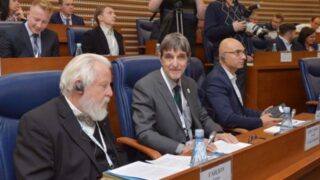Theories about “coercive persuasion” most scholars of religion regard as debunked from decades are officially advocated by governmental agencies.
by Massimo Introvigne


Some days ago, Cambridge University Press published an important book by Canadian sociologist Douglas Cowan on “The Christian Countercult Movement.” Cowan notes that I proposed in 1993 to distinguish between a Christian “countercult” movement, which denounces the doctrines of the “cults” as heresies, and a secular “anticult” movement, which claims not to be interested in doctrines but only in the harm “cults” may cause. Both Cowan and I are aware that the boundaries between the two movements are not always well defined.
Cowan believes that the “Christian countercult movement” has still a bright future before itself, because conservative Christians are still numerous, politically influential in several countries, and more interested than ever in denouncing the new religious movements that are successful in converting their members as “heretic.” On the contrary, Cowan does not predict a successful future for the secular anticult movement. It is based, he notes, on theories that “cults” convert and control their followers through “brainwashing,” also called “coercive persuasion” or “mental manipulation,” and “in liberal secular democracies, … despite its pop cultural resonance, the influence of the brainwashing hypothesis continues to wane.”
Most academic scholars of new religious movements would agree, Cowan notes, that “the brainwashing hypothesis describes an almost perfect tautological circle” that “rationalizes the most egregious interpretations of suspect religious groups and thereby justifies whatever action the anticult actors feel necessary.” Anticultists would claim that a certain group is a “cult” because it uses “brainwashing,” and at the same time that we know it uses “brainwashing” because it is a “cult.” I have presented myself this criticism of “brainwashing” theories in a book published in 2022 by the same Cambridge University Press.
Courts of law have rejected the “brainwashing” theory as part of pseudoscience in the United States, with the landmark 1990 “Fishman” decision in California, and in other countries. Cowan cautions, however, that in addition to media, pop culture, and the infotainment of cable television, the discredited “brainwashing” theories are still alive in certain countries. France comes to mind immediately, but Cowan also suggests that we watch the Spanish-speaking world. “In Spain, for example,” Cowan writes, “lawyer and legal scholar Carlos Bardavío Antón seeks to revive the brainwashing hypothesis in terms of legal statutes and to criminalize what he perceives as coercive persuasion.”


To the list of countries to watch for legal and judicial action resuscitating the dead horse of brainwashing theories and putting freedom of religion or belief in danger, it seems that Argentina should be added. Not coincidentally, Bardavío is announced among the participants in a conference promoting an anti-coercive-persuasion law organized by Pablo Salum, a bizarre anticult activist who believes that even the Catholic Discalced Carmelite nuns, the Latter-day Saints, and the Freemasons are a “coercive organization—cult.”
But in fact it appears that, even before passing a law, the Argentinian government has already embraced the faulty theory of brainwashing, ignoring that most academic scholars of new religious movements regard it as not more “scientific” that claims that the Earth is flat. All started with Salum’s campaign against a spiritual movement he was shortly partly of as a preteen more than thirty years ago, the Buenos Aires Yoga School (BAYS). He accused BAYS of brainwashing some of its female members to convert them into prostitutes, gathering money to make the School’s leaders rich. The problem with the accusation was that, without one single exception, all the alleged victims of BAYS denied both being victims and being prostitutes, which led the case against the School to collapse and all its defendants declared innocent in 2000.
However, Salum continued to peddle his theories on “coercive persuasion” and found his opportunity to be taken seriously when Argentina passed a new law against human trafficking in 2012. A special procurators’ office called PROTEX was established to fight this crime. Human trafficking is of course an international plague, and efforts to eradicate it should be applauded. However, as noted by international critics, the Argentinian law of 2012 was different from international conventions and laws of other democratic countries, which regard violence, threats, or deception as necessary elements to define a case of forced labor or prostitution as one of human trafficking. In Argentina, these are only aggravating circumstances, meaning that they may be absent, and the case can still be prosecuted as one of trafficking.
What do Pablo Salum, “cults,” and “brainwashing” have to do with human trafficking? To expand its relevance and its statistics about cases of human trafficking it prosecutes, PROTEX cooperated with Salum in developing the theory that members of “cults,” since they are “brainwashed,” are by definition victims of human trafficking. Laws on human trafficking include provisions that the fact that the victims consented to their abuse is irrelevant. These provisions were written having in mind the case of prostitutes or immigrant slave laborers unwilling to testify because they are terrorized by the criminals who exploit them. With a creative application of the statutes, PROTEX and Salum started claiming that “victims” of “cults” are under the spell of “coercive persuasion” (aka “brainwashing”). Accordingly, they are “victims” and may even be “prostitutes” without knowing it, and their denials are not relevant.
A criticism of how PROTEX inflates statistics on “victims of trafficking” in a video prepared by BAYS members (not involved in the investigation), ex-members, and relatives: https://www.veoh.com/watch/v1422931475wpgwFFS.
Based on this novel legal theory, PROTEX reopened the BAYS case that had already been decided in 2000, raided the Yoga School in 2022, and prosecuted its leaders arguing that the “victims” (in many cases, the same of the first court case, now women in their forties or fifties) denied that they had been victimized by the group leaders and compelled to become sexual workers because they were in a situation of “coercive persuasion” and therefore whatever they might say was not believable.
The court ordered an examination of the alleged “victims” by forensic experts. Without exception, they concluded that the women were in full possession of their mental competence and did not exhibit signs of post-traumatic stress or other consequences of victimization. PROTEX mobilized its own psychologists to answer that even respected forensic experts may not be able to detect the signs of “coercive persuasion” and that the absence of symptoms of post-traumatic stress in fact proved that brainwashing was still at work. The PROTEX “experts” also fell in an old fallacy by claiming that the theories on thought reform of American psychiatrist Robert Jay Lifton—controversial but part of the realm of science—and of the late clinical psychologist and anti-cult leader Margaret Singer were one and the same. This was already denounced as false by American Judge D. Lowell Jensen in the landmark American decision “Fishman” in 1990. Jensen explained that the two theories were indeed different.


All the women (since this is a unique case in the history of anti-cult repression where not even one “victim” admits being a victim) signed a letter of protest claiming that yes, they have been victimized and their lives and careers have been destroyed—but by PROTEX, not by BAYS. They also sued PROTEX’s prosecutors, a unique move in Argentinian legal history.
I profited of a visit to Argentina to interview the alleged “victims” myself. They impressed me as successful and cultivated professional women, miles away from the typical immigrant prostitute trafficked and terrorized by organized crime. Not trusting my judgement only, I encouraged two North American female (and feminist) credentialed academics to visit Argentina and interview the women themselves. They came to the same conclusion. When they denied being “victims” and ever having been prostitutes, the women were eminently believable.
To believe that we are all wrong, and only Pablo Salum and PROTEX, are right, you have to put your faith in “brainwashing,” which as other pseudo-scientific theories has its fanatical true believers that cannot be persuaded otherwise. It seems that among these believers are agencies of the Argentinian government, which creates an even more serious problem.
In democratic countries, it is unheard of that, while a court case is pending, a government publishes a statement declaring the defendants guilty. This violates both the presumption of innocence and the separation of powers, both pillars of any self-respecting democracy. Yet, this is precisely what the Argentinian government did. Perhaps implicitly answering the growing criticism by international scholars and human rights activists, on August 9, 2023, the official website of the Argentinian government published a text supporting the theory that BAYS is a “criminal coercive organization.” Cutting and pasting from the prosecutors’ accusations, the government endorses claims that are demonstrably false. For example, it writes that “In the BAYS, sexual practices were filmed. In only one of the 50 places raided, 4,100 VHS were found.” But it forgets to add that the 4,100 videos, seized in the home of the internationally well-known stage magician and BAYS member Carlos Barragán, were duly examined, and none of it showed “sexual practices.”
Even if the accusations were true, it would still be a scandal if a government intervenes in a pending criminal case. The crux of the matter is, again, brainwashing. The government believes that the accusations, although denied by the alleged victims, should be religiously believed because BAYS practices “coercive persuasion” or “brainwashing.” The authorities explain that “The expression coercive persuasion refers to a technique that consists in the realization of ‘a series of actions of psychological manipulation to control the will of a person or group with a pre-established purpose under the use of a type of force that is not perceived by the subject. It has been commonly referred to as brainwashing, to refer to the process of annulment of the previous psychosocial identity, to the destructuring, destruction or severe affectation of the personality suffered by the person without being aware of the damage.’”


These words include the important admission that “coercive persuasion” and “brainwashing” are one and the same. They are borrowed from a flyer against “coercive organizations” published in July by Presidency of the Council of Ministers, the Ministry of Social Development, the Ministry of Justice and Human Rights, the Ministry of Women, Gender and Diversity, the Ministry of Security and the Ministry of Labor, Employment and Social Security. So many branches of the Argentinian government cooperated to peddle pseudoscience, at the service of the repression of unpopular spiritual movements and the blatant violation of freedom of religion or belief.
*Academic articles on the BAYS case:
By Susan Palmer: “From Cults to ‘Cobayes’: New Religions as ‘Guinea Pigs’ for Testing New Laws. The Case of the Buenos Aires Yoga School.”
By Massimo Introvigne: “The Great Cult Scare in Argentina and the Buenos Aires Yoga School.”
Human rights analysis of the PROTEX-Salum case by Willy Fautré, part 1 and part 2.








